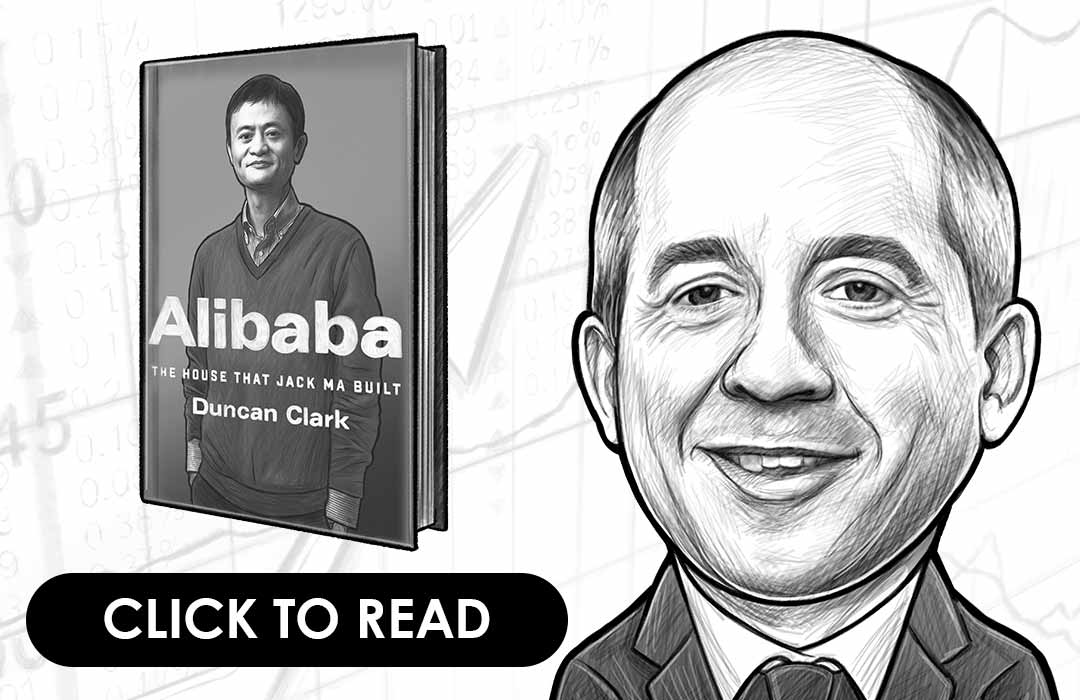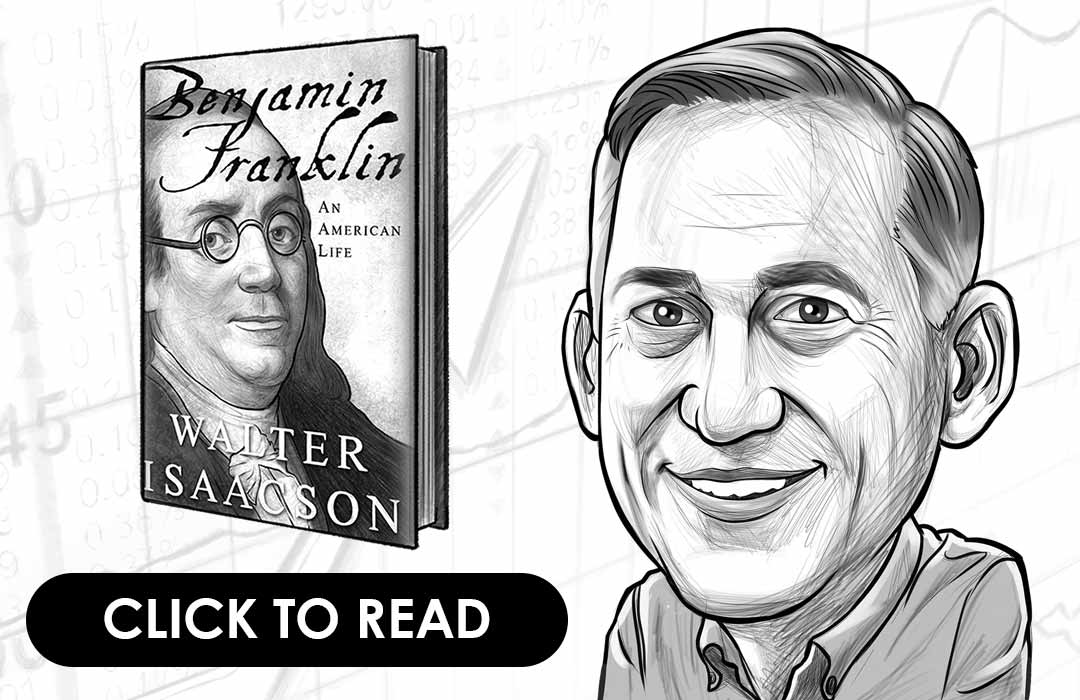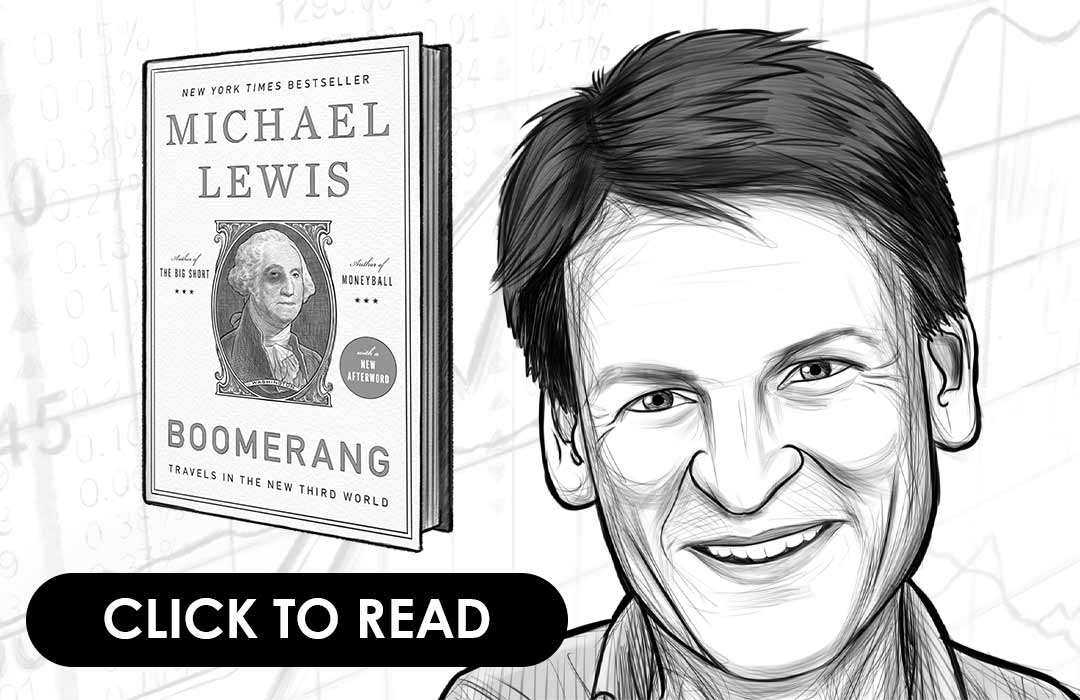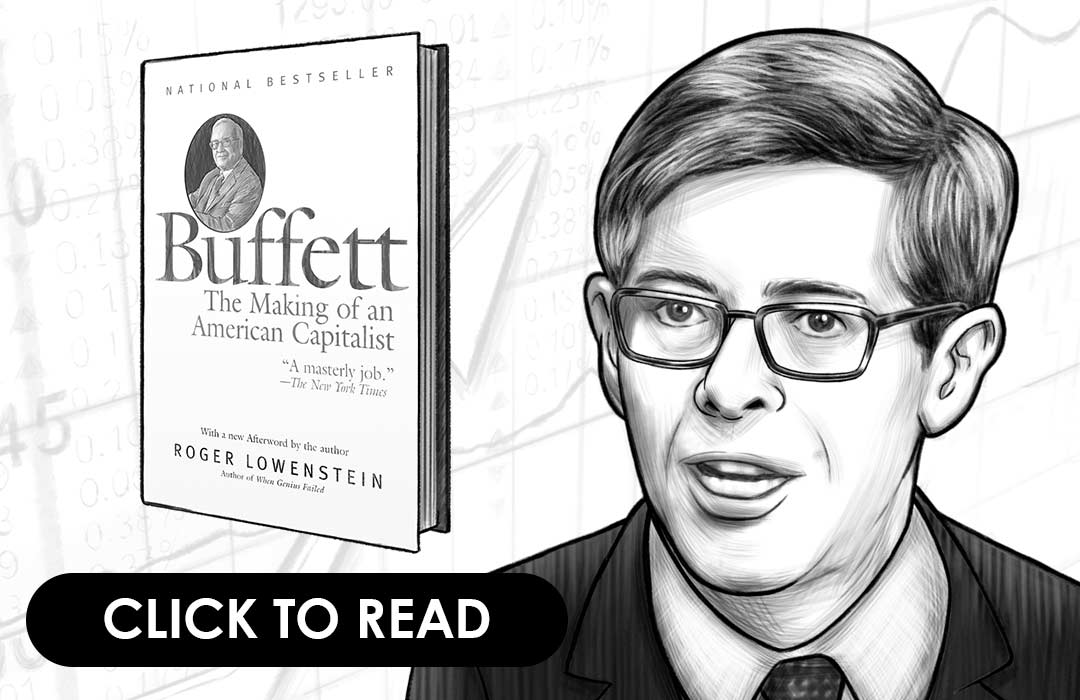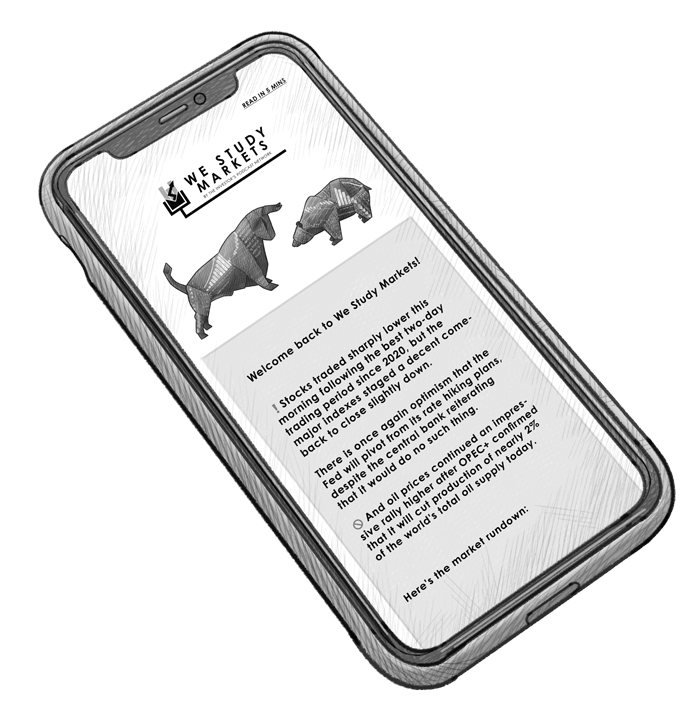An Executive Summary Of Alibaba
The House That Jack Ma Built By Duncan Clark
PRESTON AND STIG’S GENERAL THOUGHTS ON ALIBABA
Although many people in America are well aware of people like Jeff Bezos, Elon Musk, and Warren Buffett, less people are aware of the rising Chinese Billionaire, Jack Ma. Although Jack isn’t a scientist, brilliant programmer, or financial analyst, he has been able to build an incredible enterprise that show enormous promise for decades to come. In less than two decades, Jack has built the equivalent of e-‐Bay, Amazon, Paypal, and numerous other online businesses for the Chinese market. With over 407 million active users and growing (more than the US population), Jack is an expert at building huge teams and leveraging new technology for the Chinese culture. Duncan Clarks writing style was fantastic, and this book provided fantastic context into understanding what makes Jack Ma the huge success he is today.
Understand the financial markets
in just a few minutes.
Get the daily email that makes understanding the financial markets
easy and enjoyable, for free.
CHAPTER 1: THE IRON TRIANGLE
Duncan begins this chapter by describing the events that occurred on 11/11/2015 – a global shopping gala. Jack Ma stated that he only wanted to display the power of the consumers. On that day, the sales crossed well over $14 billion, amassing amounts that were about 4 times greater than the Cyber Monday sales that were launched in the US after a few weeks.
The Chinese rarely bought anything online, but Alibaba has changed that over the years. For instance, household spending drives about two-‐thirds of the US economy, but in China it didn’t even amount to one-‐thirds. The Chinese spent very little and saved their money. Further, Jack says that Alibaba was the result of an accident. With no plan and money, the company had no bright future, but thanks to its advantage in logistics, finance and e-‐commerce (the company’s iron triangle) the company finally made headway. Alibaba is at the forefront of a new shift where people don’t hesitate to buy online anymore. With Taobao.com, a website that sells almost everything, Alibaba is now changing the game.
CHAPTER 2: THE JACK MAGIC
In this section, Duncan describes Jack Ma, the man who is known as an ‘alien’ by his counterparts. Jack certainly doesn’t look like an authority figure mainly due to his small frame and owlish face with sunken cheeks. However, he has used his face to his advantage. While other powerful entrepreneurs like to boast about their rich connections, Jack likes to talk about his humble connections. With an attitude that defies stereotypes, Jack is also fondly known as ET – the extra-terrestrial that was featured in Steven Spielberg’s movie. Simply put, Jack has been underestimated all his life, but he has only made a career out of it.
What makes Jack succeed is his ability to cajole and charm people. This quality, known as ‘Jack’s magic’, has worked well for Alibaba over the years. Taking his inspiration from ‘Forest Gump’, Jack says that although everybody thought that the lead character was stupid, he certainly knew what he was doing. But, the very attribute that makes him the best is his ability to communicate. With simple words, Jack ensures that his message is clear and easy to understand. Needless to say, his quotes are extremely famous on the Internet.
CHAPTER 3: FROM STUDENT TO TEACHER
In this chapter, Duncan explores Jack’s early life while growing up in China. As a kid, Jack had an urge to learn English. Right from befriending an Australian kid to talking to other foreign nationals, Jack did everything to learn and then learn some more. Today, he says that English helped him communicate with the world and also made him understand the vast difference between the rest of the world and China. Back then, young Jack struggled to get jobs and sent out at least 11 applications, but fortunately or unfortunately for him, all of them including KFC rejected him.
Added to his troubles was the fact that Jack was bad at math. It’s mandatory for Chinese students to pass the ‘gaokao’ – a highly difficult test – to be accepted at prestigious universities, but Jack failed twice at it. However, he was accepted at a local university that wasn’t considered the best. Jack continued to study well and was financed by the Morley family.
CHAPTER 4: HOPE AND COMING TO AMERICA
As Jack turned 29, he founded a translation agency known as the Hangzhou Haibo. Haibo meant ‘hope’ and Jack hoped that his agency would help old retired teachers to make some money. These teachers had the expertise but they had no idea how to talk to customers overseas. Jack served as an intermediary to help them find customers abroad. His students from the night school helped him find customers and some of these students have worked with full-‐time since then.
During the 1990s, Jack began thinking about quitting his teaching career to build his business, but he, just like the other Chinese entrepreneurs was worried. It was tough to give up everything and become an entrepreneur in those days. Seeing an opportunity in Zhejiang, he tried to tap into its entrepreneurial fizz, but it was troubled at the very beginning. The problem was that his agency made a paltry $20 while his rent was $300. To gain more income, Jack peddled goods on Hangzhou after sourcing goods from Yiwu. As a result, his agency sold flowers, gifts, books and other items – a glimpse of what his company would do in the future.
CHAPTER 5: CHINA IS COMING ON
After his trip to Seattle, Jack returned to Hangzhou, but once he realized that his future as a teacher couldn’t provide the future he dreamed about, he immediately resigned. He now had a bigger dream that didn’t include translating or teaching. He wanted to build an online English index to help Chinese business receive customers abroad. Although many people told him that his idea wouldn’t work, he launched the China pages – a site that worked online – and collected information on Chinese companies to upload them on the Internet.
China Pages was one of the first companies that were dedicated to the Internet in China. Jack faced quite a few adversities when trying to boost the business, but once they were signed to host a Formula 1 event, their business picked up. However, there was one major problem – there was no Internet access in Hangzhou. Undeterred, Jack asked several companies to introduce themselves and sent the translated content to Seattle who would post it online. Working in a province where people didn’t even know what ‘online’ meant, Jack continued with his quest to educate people about the Internet.
CHAPTER 6: BUBBLE AND BIRTH
After struggling with China Pages and Hope Translation, Jack founded Alibaba in 1999. However, it took 2 years to get out of China Pages and his government job. At this time, other entrepreneurs marched ahead in full speed in China and people were slowly becoming aware of the Internet. China saw a flurry of entrepreneurs and this was inspired by none than Yahoo – a company that was headed by David Flo and Jerry Yang.
Jack was frustrated and worried as the others gained incredible momentum, but his meeting With Jerry Yang – the man who was already a billionaire – changed his life. Thanks to a government contract, Jack was in charge of Jerry’s tour activities, and he managed to be appointed as Yahoo’s exclusive sales agent in China. Even after trudging ahead, Jack still late in the portal game that was dominated by NetEase, Sohu and Sina. These portals focused on individual users who came online, but Jack decided to concentrate on small businesses that were still growing.
CHAPTER 7: BACKERS: GOLDMAN AND SOFTBANK
China.com closed its first day at Nasdaq at $1.6 billion and this gave way to many more dotcom companies that sprung up like weeds. With the Internet bubble gaining speed in China, Alibaba had to fight to get its share of attention. Jack visited many tech conferences and was recognized by many as a powerhouse. Pretty soon, it was predicted that one would make a lot of money by investing in Alibaba. This opened up Alibaba’s doors to many international investors.
By then, Goldman Sachs had also shown interest to invest in China where the action was just taking off. However, with the locals unaware about the Internet and technology, it was pretty difficult to associate with anybody even though they received thousands of proposals. Shirley, working for Sachs, met Jack and they finally agreed on buying 500,000 shares for $5 million. Jack had little choice but to accept. With 50% of the company’s shares gone, he had to settle with fewer shares. Later, he would regret this decision and only half-‐joked when saying that it was the worst decision he ever made.
CHAPTER 8: BURST AND BACK TO CHINA
By 2000, Alibaba had more than 1000 members sign up each day. It was great progress but there was immense competition from other companies like MeetChina and Global Sources. Jack realized that he had to step up his hiring to match the speed of his competitors. At this point, there was a lot of talk of going public, but the other three giant online portals had hit a block because the Chinese government’s fear of giving up control was increasing by the day.
However, thanks to a compromise between the government and Sina, the IPO was launched and the remaining two portals followed suit. But, trouble soon reared its ugly head as the companies couldn’t manage things once they went public. This was because the bubble had burst and the IPO doors were shut for many Chinese Internet companies including Alibaba. Jack saw this as an advantage since his competitors would stop getting funds and began hiring more foreign nationals and travelled extensively.
CHAPTER 9: BORN AGAIN: TAOBAO AND THE HUMILIATION OF EBAY
With the three portal pioneers launching their IPO, Jack knew that they were ahead of him, so he invited them to a business conference with a Martial Arts theme. Later, two companies that were leading the Internet helm were felled due to their own problems, leaving only Jack and Charles Zhang from Sohu to continue with their companies. At this point, eBay was gaining recognition as a top company due to its IPO valuation that had grown from $2B to $30B in 2000.
Almost everybody wanted to start a company that resembled eBay and Shao Yibo, the man who founded EachNet, surprisingly raced ahead of the others, competing against Alibaba that was also planning to take the eBay route. However Jack had finally met his match in Shao Yibo who had just returned from Harvard school. But, EachNet soon discovered that they had to sell out to eBay itself if they ever hoped to become the eBay of China.
CHAPTER 10: YAHOO’S BILLION-DOLLAR BET
This chapter begins with a peek into the life of Jerry Yang who cofounded Yahoo along with David Flo. Like Jack, Jerry also began with modest conditions, but his hard work on Yahoo made him a billionaire within no time. With Jerry at the forefront, the company had a lot of expectations in China. Luckily, the site was a big hit in China, drawing thousands of visitors every day. However, they had to deal with the government that wanted complete control and signed up with Founder – a company that had good connections with the government.
After a while, Yahoo realized that they were failing in China, even though they had Founder alongside them. Founder’s connections with the government didn’t prove to be as successful as they thought it would be, and Yahoo struggled miserably with poor content hosted on the site. This failure opened the floodgates to upcoming companies like Alibaba, Baido and Tencent.
CHAPTER 11: GROWING PAINS
After eBay left the Chinese market Taobao’s sales had increased from $2B to 30B, and this definitely spelt good news for Alibaba. The Chinese economy also increased by 14%, giving Alibaba a great opportunity but although other successful companies had their IPO, Alibaba was yet to go public. While others questioned their decisions, Alibaba was busy making changes by hiring top executives from companies like Pepsi and Wal-‐mart. Although Taobao was going great, it was still a business that offered free listings, and they were yet to figure out a way to monetize it. Therefore, Alibaba decided to only list Alibaba.com in its first IPO. As the largest internet IPO in entire history after Google, Alibaba was valued at $9 billion.
Understand the financial markets
in just a few minutes.
Get the daily email that makes understanding the financial markets
easy and enjoyable, for free.
CHAPTER 12: ICON OR ICARUS
Duncan begins this last chapter with a detailed explanation of Alibaba’s second IPO. Jack was the centre of attraction, and instead of shying away from the risk factors, he took the challenge head-‐on and faced the investors. This time around, Alibaba raised $25 billion, making it the largest sum in the history of IPOs. As Hong Kong had rejected Alibaba’s appeal, this IPO was hosted in the New York Stock exchange and became a huge hit.
Alibaba rose to glory and almost touched $300 billion, but soon it plummeted hard, falling 50% below the initial price. The shares had fallen mainly because of a dispute between Jack and a member of a government agency. However, despite all odds, the employees of Alibaba didn’t give up hope. Jack continues to brainstorm new ideas today and even though Alibaba is treading into dangerous waters and facing criticism each day, Jack’s enthusiasm for life hasn’t reduced even a bit.

